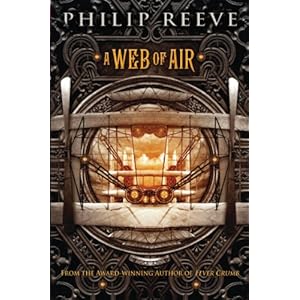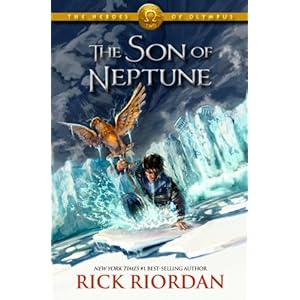
How I found this book:
I detested the beginning of Shiver but remembered the odd name of the author; when I saw this book on the New Teen Books display at the library, I scanned it (must have been only the back cover excerpt?) and brought it home in one of the most trusting book-obtaining sprees I have ever gone on. I don't know what got into me, really. But this time it worked...
To be open and up-front with you, readers, I am 100% wowed with this book. I am buying myself a copy. I may also get horseback riding lessons. Who knows?
And I love the cover, too.
Book in a nutshell:
The island of Thisby (apparently supposed to be somewhere off the English or Irish coast) has one unique thing, one terrible and beautiful thing that sets it apart. It has the capaill uisce, the water horses, that come out of the sea in late autumn - the horses who eat meat, who kill humans, and who run like the wind.
The Scorpio Races is a yearly event on the first of November. In the month before, as the capaill uisce come up, people begin to train and ready for it. But this isn't a horse race. This is a water horse race, along the beach, fighting to control your magical mount and not be attacked by anybody else's on the way.
This is the story of two competitors: Puck Conolly, a stubborn girl hoping to win the race so as to earn money to save her family's home, and Sean Kendrick, a young man who rides a capaill uisce that belongs to him in all but lawful contract. The stakes are high, and the training season is beginning.
---
The Scorpio Races is a heartwrenching, beautiful, fast-paced book with just the right amount of everything. It's for horse-lovers and fantasy-lovers and action-lovers - if you're looking for just a romance, there's one here, too, though it's pretty subtle compared to many out there.
This is a very well-written book. Ms. Stiefvater doesn't waste words, but she scatters them well; the Festival scenes were especially well-done. Though the dual-narrators thing occasionally left me confused as to who the "I" was at a given point, I didn't count points off. It was a good way of telling the story - in fact, the best that I could think of.
The capaill uisce (Author's Note assures us it's pronounced CAPple ISHka) especially resonated with me, as I have a peculiar mix of love/fear feelings toward horses. I never had too much experience with them, and I doubt I'll ever lose my slight wariness when around them. Even though these are fantasy horses, I felt that I could transfer some of the characters' feelings to apply to real-life horses: respect, admiration, excitement, sometimes love, occasionally a degree of trust, an understanding of the power of the animal and the potential harm they can inflict. (If you are a horse lover, please understand I do not mean to insult domestic horses. I've met many lovely horses in my life and know that most of them are perfectly friendly. But I respect them, their size, and their occasional unpredictable behavior.)
It's a story about losing things, or being on the brink of losing them, or considering whether you have them at all. Puck's brother Gabe wants to leave his orphaned brother and sister and go to the mainland. Sean wants his own life, outside of the stable where he's been working for nine years, and most especially wants to own his capaill uisce Corr for himself. Puck wants to keep her life together and not lose the house - or her brother Gabe. Odious Mutt Malvern wants something... the lovable Dory Maud and her sisters want something... Some wishes are possible, some seem impossible. Some are granted, some not.
Another interesting theme is Puck herself. She's not only the first girl to run in the Scorpio Races, but also... an atypical entrant in other ways (avoiding spoilers here). She undergoes all kinds of attempts to get her to withdraw her entry, attempts made by people with reasons ranging from tradition to sheer meanness. And when she's asked at one point whether she was "inspired by the women's suffrage movement," she answers, "I'm just a person with a horse, same as anyone else on this island." True. I don't see Puck as a feminist. She's not trying to be revolutionary; she's just being herself.
I also noticed a strong thread about home and belonging. Sean dreams of having his own farm. Puck wants to keep living in the house with her brothers. They belong on Thisby - they belong to Thisby. But others - such as Gabe and his friends - speak of not being able to stand the island, of wanting to leave. And then there are the tourists, including George Holly, who love Thisby but only for as long as the exciting races are going on.
I could hardly put this book down. Nearly every suspicion and guess I had about plot outcomes was disproven. Ms. Stiefvater made a bright, dangerous, living little world that I'm sorry to leave, even though I half-imagine it's going on still while I have my back turned! My heart went out to many of the characters. For a moment I even felt sorry for Mutt. But this is a book of hope, as well as loss, and the last page brought tears (of joy) to my eyes. (Yes. Rina, who didn't cry during any of the Hunger Games books, cried at the ending of The Scorpio Races. Finish it, and you'll see why to.)
Age rec: I'd say 13, 14 and up. There are some references to things, but nothing I considered terribly embarrassing - a little swearing, too - and the romance is surprisingly light (esp. considering what I've heard of the author's previous work). The worst that can be expected are the rude insults and ragging that Puck receives as persecution from hostile islanders. I can definitely recommend this book for boys and for girls, for teens and for grownups.


